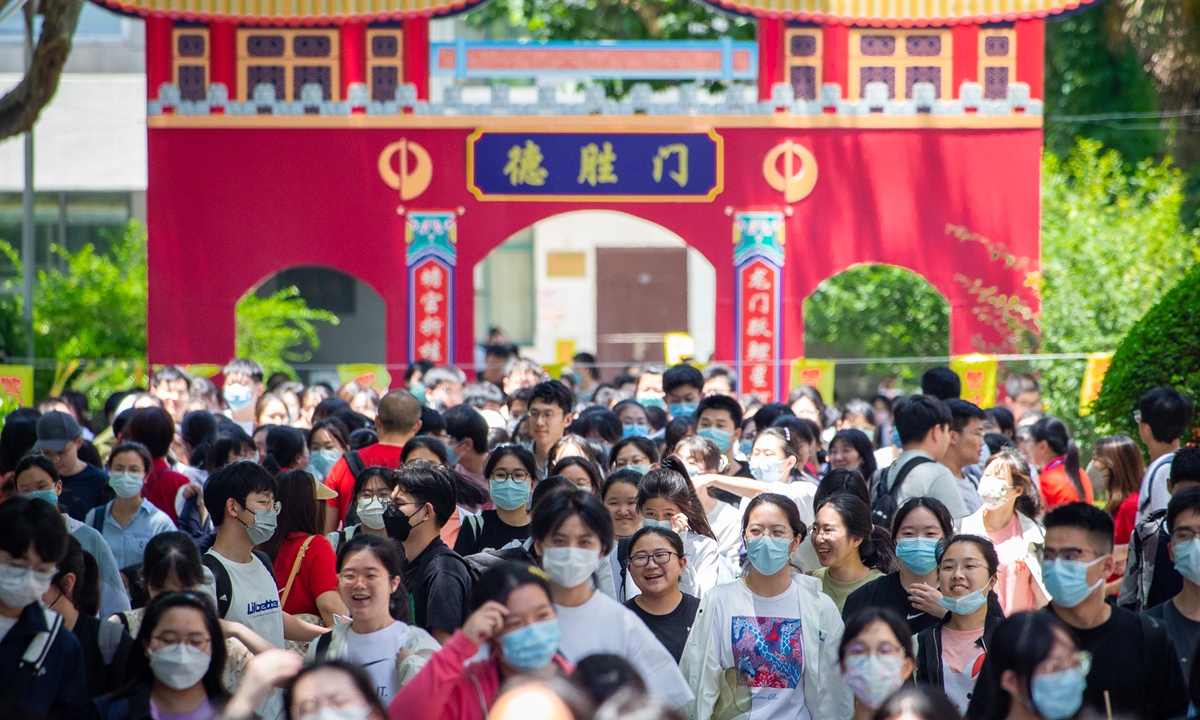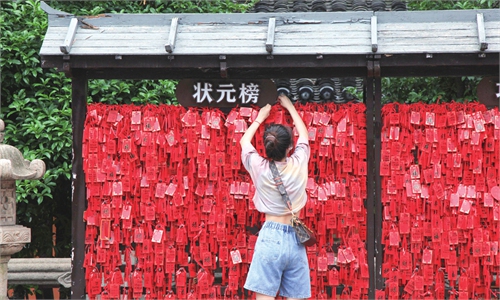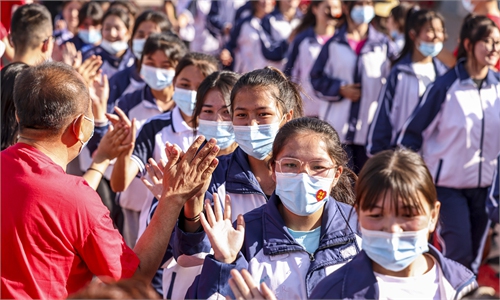A record 11.93 million people trooped to examination rooms across the country on Tuesday as the annual national college entrance exams, known as gaokao, officially kicked off, which is also considered China's most important exams as it will play an important role in shaping examinees' fate. Dubbed as a generation of the COVID-19 era, high school graduates of China this year have gone through a special and challenging path as the past two years of fighting the epidemic.
As usual, the essay questions on the first day of gaokao, widely seen as a reflection of the country's general public values, sparked heated discussions online. By including anecdotes from Chinese classics the Story of Stone, revolutionary culture of the Communist Party of China based on the materials such as the Long March, the Untold Story - a book by an American journalist that chronicles an unprecedented journey in the military history, and Beijing, as the world's first city to hold dual Olympics, those essay questions embody both philosophy and understanding of current affairs, requiring students' logical thinking with their own reflection on reality, observers said.
These young people, who are also known as Generation Z born in the late 1990s and early 2000s, are believed to be much more confident and optimistic in the face of different challenges, and for some of them, taking the most important exams under epidemic restrictions is just one of those challenges that they will eventually overcome.

Special moment
This year, the quarantine policy is particularly strict, and the students have been studying at home since May for the exams, a mother of a student from the Experimental High School attached to Beijing Normal University, surnamed Luan, told the Global Times on Tuesday.
By following the epidemic prevention measures issued by the government, the school collects body temperature data and daily itinerary of the students to ensure their safety, and also require parents to submit their health code, she said.
"I'm more nervous than my son. My son and his classmates were born after SARS and are taking the exams during COVID-19. It's not easy," the mother said.
A total of 330,000 test sites were set up across the country. Places including Beijing, Northeast China's Liaoning and Southwest China's Sichuan set up special locations for 12 infected students who are in Fangcang makeshift hospitals. Nationwide, 120 students under quarantine took the exams at test rooms at their quarantine venues, according to media reports.
Since gaokao resumed more than 40 years ago, it has been conveying a great significance for Chinese youth in their path of growing up. This is considered as the fairest and most effective way to select candidates for college and this system still has a strong vitality, Zhang Yiwu, a Peking University professor, told the Global Times.
"Every generation has their own mission. The current exams are highly competitive, but at the beginning of the resumption of the exams, the young people took the exams because they didn't have many choices. It's hard to say whether gaokao has become harder or easier now than it was several decades ago," he said.
Zhang Shuxing, a student from the Experimental High School attached to Beijing Normal University who took the exams on Tuesday, told the Global Times that she wrote about the epidemic in her essay as "we are the generation that has experienced the whole process of epidemic."
"Studying during the epidemic requires more self-control. At least I now know how to study independently, and how to control my temper and emotions, and then I will not be afraid of any difficulties in the future," she said.
One of the essay questions in Beijing requires students to describe a design in a nucleic acid testing spot with a two-meter safety distance. Some suggested using umbrella and others suggested posting the pictures with ancient poems on the ground. And the essay question in Tianjin asked students to reflect on the "hustle and bustle" of the city, a common phenomenon in normal days but becoming precious when the strict restrictive measures are implemented in the city.
An essay question in the national exam paper laid out some facts about Beijing holding the Summer Olympics and the Winter Olympics in 2008 and 2022, respectively, asking the students to collect various information to demonstrate the sports spirit, social development, innovation and the country's growth.
In the past, students were given the written materials first and then asked to analyze the information in the materials in their essay. This year's essay questions are more diverse, no longer being constrained in the analysis of the material, and also prevent the student from using the examples they prepared beforehand, Xiong Bingqi, deputy director of the Shanghai-based 21st Century Education Research Institute, told the Global Times.
"Half of this year's essay questions reflect the times, and the core is to examine students' ability to identify and express their ideas, which is related to the epidemic situation in the past three years. But it can also be seen that these essay questions are trying to avoid magnifying the influence of the epidemic," Xiong said.
Challenges remain
This year's students are special, spending a lot of time online learning, and many of them have not experienced the activities that students in the past took. "But the psychological tolerance and life experience of these students are unique, and the ability to positively face the changes in the environment and deal with problems has also been greatly improved," he said.
Although the number of applicants for gaokao has increased, its admission rate in recent years has been on the rise, and has exceeded the growth rate of the number of applicants, observers said.
The country also saw record college graduates in 2022 as an unprecedented 10.76 million graduates are expected to start work despite pressure posed by the COVID-19.
However, the central government attaches great importance to youth employment. While some observers explained that the increase in the number of candidates is mainly due to the increase in greater enrollment in vocational high schools, some have doubts whether they will face greater employment pressure four years later.
"It's still the first choice for the majority of high school students to go to college, especially when there's a variety of employment. But employment pressure is for the future, and colleges will train them to improve their capabilities," Xiong said.
As usual, the essay questions on the first day of gaokao, widely seen as a reflection of the country's general public values, sparked heated discussions online. By including anecdotes from Chinese classics the Story of Stone, revolutionary culture of the Communist Party of China based on the materials such as the Long March, the Untold Story - a book by an American journalist that chronicles an unprecedented journey in the military history, and Beijing, as the world's first city to hold dual Olympics, those essay questions embody both philosophy and understanding of current affairs, requiring students' logical thinking with their own reflection on reality, observers said.
These young people, who are also known as Generation Z born in the late 1990s and early 2000s, are believed to be much more confident and optimistic in the face of different challenges, and for some of them, taking the most important exams under epidemic restrictions is just one of those challenges that they will eventually overcome.

Students walk out of a test site in Nanjing, East China’s Jiangsu Province after taking the first subject of their college entrance examinations on June 7, 2022. Photo: VCG
Special moment
This year, the quarantine policy is particularly strict, and the students have been studying at home since May for the exams, a mother of a student from the Experimental High School attached to Beijing Normal University, surnamed Luan, told the Global Times on Tuesday.
By following the epidemic prevention measures issued by the government, the school collects body temperature data and daily itinerary of the students to ensure their safety, and also require parents to submit their health code, she said.
"I'm more nervous than my son. My son and his classmates were born after SARS and are taking the exams during COVID-19. It's not easy," the mother said.
A total of 330,000 test sites were set up across the country. Places including Beijing, Northeast China's Liaoning and Southwest China's Sichuan set up special locations for 12 infected students who are in Fangcang makeshift hospitals. Nationwide, 120 students under quarantine took the exams at test rooms at their quarantine venues, according to media reports.
Since gaokao resumed more than 40 years ago, it has been conveying a great significance for Chinese youth in their path of growing up. This is considered as the fairest and most effective way to select candidates for college and this system still has a strong vitality, Zhang Yiwu, a Peking University professor, told the Global Times.
"Every generation has their own mission. The current exams are highly competitive, but at the beginning of the resumption of the exams, the young people took the exams because they didn't have many choices. It's hard to say whether gaokao has become harder or easier now than it was several decades ago," he said.
Zhang Shuxing, a student from the Experimental High School attached to Beijing Normal University who took the exams on Tuesday, told the Global Times that she wrote about the epidemic in her essay as "we are the generation that has experienced the whole process of epidemic."
"Studying during the epidemic requires more self-control. At least I now know how to study independently, and how to control my temper and emotions, and then I will not be afraid of any difficulties in the future," she said.
One of the essay questions in Beijing requires students to describe a design in a nucleic acid testing spot with a two-meter safety distance. Some suggested using umbrella and others suggested posting the pictures with ancient poems on the ground. And the essay question in Tianjin asked students to reflect on the "hustle and bustle" of the city, a common phenomenon in normal days but becoming precious when the strict restrictive measures are implemented in the city.
An essay question in the national exam paper laid out some facts about Beijing holding the Summer Olympics and the Winter Olympics in 2008 and 2022, respectively, asking the students to collect various information to demonstrate the sports spirit, social development, innovation and the country's growth.
In the past, students were given the written materials first and then asked to analyze the information in the materials in their essay. This year's essay questions are more diverse, no longer being constrained in the analysis of the material, and also prevent the student from using the examples they prepared beforehand, Xiong Bingqi, deputy director of the Shanghai-based 21st Century Education Research Institute, told the Global Times.
"Half of this year's essay questions reflect the times, and the core is to examine students' ability to identify and express their ideas, which is related to the epidemic situation in the past three years. But it can also be seen that these essay questions are trying to avoid magnifying the influence of the epidemic," Xiong said.
Challenges remain
This year's students are special, spending a lot of time online learning, and many of them have not experienced the activities that students in the past took. "But the psychological tolerance and life experience of these students are unique, and the ability to positively face the changes in the environment and deal with problems has also been greatly improved," he said.
Although the number of applicants for gaokao has increased, its admission rate in recent years has been on the rise, and has exceeded the growth rate of the number of applicants, observers said.
The country also saw record college graduates in 2022 as an unprecedented 10.76 million graduates are expected to start work despite pressure posed by the COVID-19.
However, the central government attaches great importance to youth employment. While some observers explained that the increase in the number of candidates is mainly due to the increase in greater enrollment in vocational high schools, some have doubts whether they will face greater employment pressure four years later.
"It's still the first choice for the majority of high school students to go to college, especially when there's a variety of employment. But employment pressure is for the future, and colleges will train them to improve their capabilities," Xiong said.


